In Python there is a builtin function pow which optimizes calculation of a**b%c. Why isn't there a function that calculates a**b//c?
1 Answers
I'll try to conclude here why calculation of a ** b // c can't be optimized, unlikely to a ** b % c.
Prerequisites: calculation of a ** b % c
Let's take an illustrative example: say a=2 and b=11. If we assume it's quite slow, then we are able to deduce that b = 1 + 2 + 8 = 2**0 + 2**1 + 0*2**2 + 2**3. After that this deduction can be used as a rule for multiplication of results a, a**2, a**4, a**8. Each result is assigned after squaring a previous one. Finally, a**11 = a*(a**2)*(a**8) and this process requires only 3 squarings.
If we generalize this process, this can be done like so:
a, b, r = 2, 11 , []
while b>0:
if b % 2: r.append(a)
b = b//2
a = a*a
else:
if b % 2: r.append(a)
print(r)
An output is r=[2, 4, 256]. Next, we need to multiply these multipliers. It can be done using from functools import reduce with a command reduce(lambda x,y: x*y, r).
Finally, if multipliers gets quite huge, multiplication get's very slow, so we need to replace each multiplier m with its modulus m%c and do the same in reduce function. Finally, we have:
from functools import reduce
def pow(a, b, c):
# returns a ** b % c
r = []
while b > 0:
if b % 2: r.append(a)
b = b // 2
a = (a * a) % c
else:
if b % 2: r.append(a)
return reduce(lambda x, y: (x * y) % c, r)
Output is 4 since 2 ** 11 % 7 is 4.
I've tested also result 2046457 ** 1103207 % 71872 on my computer. An output was 18249 and it took 9 seconds to calculate while pow(2046457, 1103207, 71872) gave the same result instantly.
Update: plugging a ** b // c into calculation
Following abovementioned ideas, I'll try to achieve similar optimisation for calculation of a**b // c. I assume that squaring process remains the same and the main difference here is that we need to consider both integral and residual parts while taking squares (previous was easy because integral part was not important). If x is an integral part and y is residual one, we have a relation:
We also need to introduce similar calculation for two distinct multipliers:
My script looks like this now:
from functools import reduce
def pow(a, b, c):
#returns tuple (a ** b // c, a ** b % c)
print(f'calculating: {a}**{b} = ', end='')
r = []
ir = (a//c, a%c) # we keep integral and residual part of a instead of a
while b > 0:
if b % 2: r.append(ir)
b = b // 2
ir = (ir[0]*ir[0]*c + 2*ir[0]*ir[1]+ (ir[1]*ir[1])//c, (ir[1]*ir[1]) % c)
else:
if b % 2: r.append(ir)
out = reduce(lambda x, y: (c*x[0]*y[0] + x[0]*y[1] + x[1]*y[0] + (x[1] * y[1])//c, (x[1] * y[1]) % c), [(2, 2)]+[r[-1]])
print(' * '.join(str(n[0]*c+n[1]) for n in r), end=' = ')
print(' * '.join(str(n) for n in r),'=', out)
return out
pow(2,7,3)
Output
calculating: 2**7 = 2 * 4 * 16 = (0, 2) * (1, 1) * (5, 1) = (42, 2)
Notes
Why it's not optimization still? We can see that second term in each factor remains always small but this is not a rule for the first terms like in this example of pow(26,31,35):
calculating: 26**31 = 26 * 676 * 456976 * 208827064576 * 43608742899428874059776 =
(0, 26) * (19, 11) * (13056, 16) * (5966487559, 11) * (1245964082840824973136, 16) =
(89709413964539398065824, 32)
In this case we can't avoid exponential growth of a%b // c. This is why no existent builtin function for a%b // c seems reasonable for me.
- 5,759
- 1
- 14
- 34
-
Is this not more at home on a blog (or a whitepaper)? You don't seem like you need help with this... – Oliver.R Jan 20 '20 at 04:48
-
I have posted this as a variation of pretty similar problem posted here: https://stackoverflow.com/questions/59813128/can-this-script-have-better-performance-using-modular-exponentiation – mathfux Jan 20 '20 at 04:52
-
1@Oliver.R Sharing knowledge you've found out the hard way is what self-answering is for. (Usefulness of this specific factoid may be debatable; but "will anybody else ever face this problem" isn't a criterium on regular questions either.) – millimoose Jan 20 '20 at 04:52
-
@millimoose Fair points, thanks for your insight - mathfux I apologise for my unnecessary comment! – Oliver.R Jan 20 '20 at 05:02
![[1]: https://i.stack.imgur.com/ReNeV.gif](../../images/3784313912.webp)
